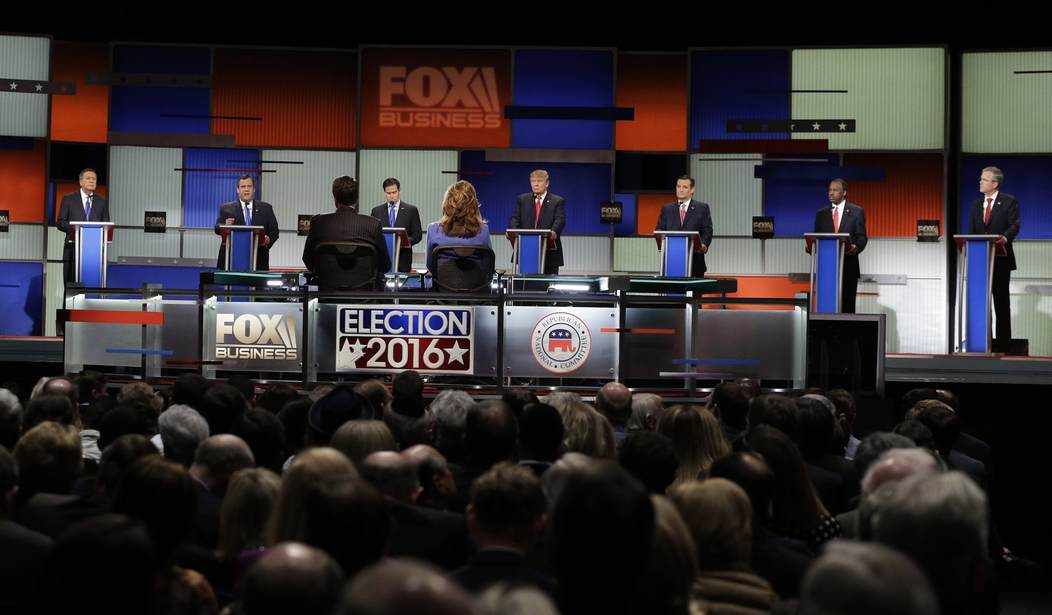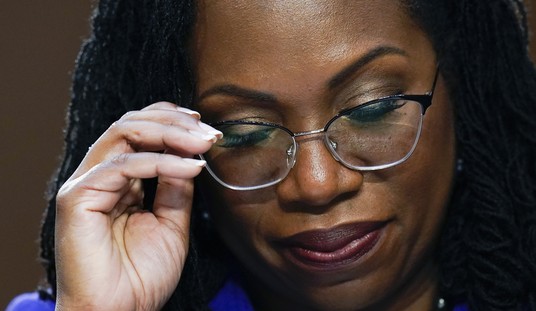On the top of the list of statements for “you know you’re a political nerd when …” might be the following: Thursday night’s GOP debate was exhilarating because it showed me some important facts about the texture of the race. Here are my five takeaways:
1. Stay out of the way of Cruz and Trump when they counterpunch.
When Sen. Ted Cruz was asked about a loan he used to finance his Senate campaign or about Donald Trump’s birther allegations, he swiftly turned both issues to his advantage. Even a non-Cruz supporter watching the debate commented to me that Cruz “nailed Trump to the wall” answering the natural born citizenship question, using sarcasm, humor, and a Teflon grin. And when Rubio fired at Cruz late in the debate, Cruz’s comeback, “I appreciate your dumping your oppo research folder on the debate stage”—followed by reminding voters of the Gang of Eight bill—neutralized the blunt-force trauma of Rubio’s barrage, leaving the exchange an asterisk.
However, Trump can also punch back: he seemed to have the upper hand when Cruz jabbed him on “New York values,” as well as when the moderators asked him about Gov. Nikki Haley’s comments about Trump’s anger (guess what? He wears anger proudly). Those were two of the best moments for Trump in this or any debate.
2. Early air-time matters most.
Cruz used his first answer of the night to remind the audience of the compelling image of ten American sailors being forced to their knees by Iranian soldiers, resonating immediately and powerfully from the outset. Because many voters didn’t watch to the end of the debate (or had their DVRs cut off the last part of the debate when it ran late), I weight points scored at the beginning more than at the end. Since Cruz’s best moments came out early in the evening, with Trump’s in the middle, and Sen. Marco Rubio’s at the end, I would give Cruz the edge as having the best night.
3. It’s a three-candidate race.
There’s Cruz, Trump, and Neither-Trump-nor-Cruz. The race has had a lot of talk about lanes: Outsider, Evangelical, Libertarian, Tea Party, Establishment, etc. According to this conventional wisdom, Trump has dominated the role of outsider, Cruz has consolidated the tea party and much of the libertarian and evangelical vote, and there’s a close fight between Rubio, Kasich, Bush, and Christie for the establishment lane. Ben Carson clearly struggled Thursday night, outdone in all three slots but still loved enough to make the debate stage. However…
4. The “establishment” is not a monolith.
For example, Gov. Jeb Bush and Rubio have long been committed social conservatives on life and marriage, whereas Gov. Chris Christie is far more socially liberal. If the “establishment” were a unified force in the race, it would have done a far better job consolidating its money, talent, and voter base behind a single candidate by now. Instead, it seems more like a bare plurality of all ideological stripes in the party isn’t convinced by Trump or Cruz, and is seeking an alternative.
5. Risk aversion explains why Rubio has not closed the deal to be the Cruz-Trump alternative.
Rubio changed his style the most on Thursday, adding more passion and aggression. Several of my friends remarked that he was more “Cruz-like.” This means his team has realized his winsomeness alone has not vaulted him into the alternative spot.
But the Trump, Cruz, and Neither groups could be arranged on a risk toleration continuum: Trump represents voters who are likely to believe things are so bad in the country, they cannot get much worse. Thus, they are willing to take a huge (yuuuge?) risk on a candidate who has never held office and might not actually share traditional Republican policy goals.
Cruz supporters want a shake-up, too, and know Cruz would dismember much of Washington’s current tapestry of lobbyists and insiders, but these voters seem slightly more cautious. Despite being repeatedly chided that Cruz could lose due to either his ideology or personality, they admire Cruz’s discipline and organization as well as his boldness and philosophical cogency.
The last group, (those on Team Rubio or wavering between him and another “Neither” candidate), are the least risk-tolerant: they tend to prefer the national apple cart as it is, and don’t care to upset it. I think they care a great deal more about likability and electability than ideology. But Rubio’s youth, apparent lack of ground organization, and failure to gain popular traction despite turning in six-for-six solid debate performances function as a negative feedback loop, seeming to repel his potential front-runner status. Body-slams from Christie (“you blew it”) haven’t helped, either.
Ordinarily, the GOP’s risk-averse voters wildly outnumber risk-preferring voters (just look at seven of the last eight nominees: Nixon, Ford, Bush, Dole, Bush, McCain, and Romney). But after two risk-averse nominees didn’t deliver, much of the GOP electorate looks interested in bucking the trend. I don’t think Trump can ever satisfy the waning but strong risk-averse core of the party. But until Cruz reassures that group enough to make this a two-person race, at least five or six candidates (hi, Rand Paul!) will continue to fight to be that safe-bet alternative.









Join the conversation as a VIP Member